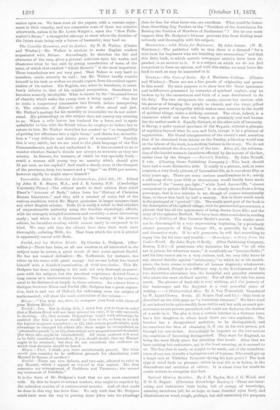Euclid, and his Modern Rivals. By Charles L. Hodgson. (Mac-
millan.)—There has been, as all our readers at all interested in the subject must be aware, a great revolt of late years against Euclid. He has not wanted defenders—Mr. Todhuntor, for instance, has taken up his cause with groat energy—but no one before has busied himself with a detailed examination of rival text-books. This Mr. Hodgson has done, bringing to his task not only thorough acquaint- arum with his subject, but the practical experience derived from a long career as a mathematical lecturer. The subject is far too tech- nical to be discussed at length in those columns. An extract from a dialogue between Minos and Euclid (Mr. Hodgson has a groat reputa- tion, both in and out of Oxford, for enlivening oven the subject of mathematics), will show the main contention of the volume :-
Minos.—"" You wish me, then, to compare your book with those of your Modern Rivals P
Euclid.—Yes. But in doing this, I must beg you to bear in mind that a Modern Rival will not have proved his case, if he only succeeds in showing,—(1), that certain Propositions might with advantage be omitted (for this a teacher would be free to do, so long as he left the logical sequence complete) ; or (2), that certain proofs might, with advantage be changed for others (for these might be interpolated as alternative proofs') ; or (3), that certain now propositions are desirable (for these also might be interpolated). All these matters will need to be fully considered hereafter, if you should decide that my Manual ought to be retained ; but they do not constitute the evidence on which that decision should be based, Mince.—That, I think, you haVe satisfactorily proved. But what would you consider to be sufficient grounds for abandoning your Manual in•favour of another ?
Euclid.—There aro two defects, and two only, allowed to exist in my Manual, which I regard as crucial in this matter. The first concerns my arrangement of Problems and Theorems; the second my treatment of Parallels."
It is the form of Mr. Dudgeon's book that wo are most concerned with. By this he hopes to attract readers, who might be repelled by the unbroken routine of a controversial treatise. And all that could be done in this way has been done. Wo only wish that Mr. Hodgson could have seen his way to putting more jokes into his pleadings than be has, for what there are, are excellent. What could be better than describing Guy Fawkes as the "President of the Association for Raising the Position of Members of Parliament"' P But no one must nuppose that Mr. Dudgeon's humour prevents him from dealing most seriously and thoroughly with his subject.
































 Previous page
Previous page